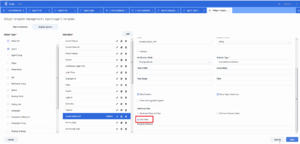(Modified comment string __NOINDEX__ Category:V:PSAAS:Public with Category:V:PSAAS:Public) |
(Modified comment string {{Template:PEC_Migrated}} with __NOINDEX__ {{Template:PEC_Migrated}}) |
||
| Line 1: | Line 1: | ||
= Template Function Library= | = Template Function Library= | ||
| + | __NOINDEX__ | ||
{{Template:PEC_Migrated}} | {{Template:PEC_Migrated}} | ||
Latest revision as of 12:32, October 2, 2020
Template Function Library
Once you know how to use formulas, you can use this function library as reference for additional customization.
Below is a function library for Genesys Pulse standard templates as automatically generated from Genesys Pulse, starting with release 8.5.102.02.
Contents
- 1 Template Function Library
- 1.1 GetAgentNonVoiceStatus(state, media) → {string}
- 1.2 GetAgentVoiceStatus(state) → {string}
- 1.3 GetANI(state, switchID) → {string}
- 1.4 GetBusinessResult(state)
- 1.5 GetCustomerSegment(state)
- 1.6 GetDNIS(state, switchID) → {string}
- 1.7 GetEmployeeId(state) → {string}
- 1.8 GetExtension(state) → {string}
- 1.9 GetLoginId(state) → {string}
- 1.10 GetPlace(state) → {string}
- 1.11 GetPosition(state) → {string}
- 1.12 GetReasonCodes(state) → {string}
- 1.13 GetServiceSubType(state)
- 1.14 GetServiceType(state)
- 1.15 GetStatusDuration(state) → {Number}
- 1.16 GetSwitches(state, sep)
- 1.17 GetUserDataValue(state, key)
GetAgentNonVoiceStatus(state, media) → {string}
Parameters:
| Name | Type | Description |
| state | AgentCurrentState | Current state of the agent (typically, Value of the appropriate statistic). |
| media | string | Media name. |
Returns:
Type = string
GetAgentVoiceStatus(state) → {string}
Parameters:
| Name | Type | Description |
| state | AgentCurrentState | Current state of the agent (typically, Value of the appropriate statistic). |
Returns:
Type = string
GetANI(state, switchID) → {string}
Parameters:
| Name | Type | Argument | Description |
| state | AgentCurrentState | Current state of the agent (typically, Value of the appropriate statistic). | |
| switchID | string | <optional> | Optional switch name to limit the search. |
Returns:
Type = string
GetBusinessResult(state)
Parameters:
| Name | Type | Description |
| state | AgentCurrentState | Current state of the agent (typically, Value of the appropriate statistic). |
Returns:
GetCustomerSegment(state)
Parameters:
| Name | Type | Description |
| state | AgentCurrentState | Current state of the agent (typically, Value of the appropriate statistic). |
Returns:
GetDNIS(state, switchID) → {string}
Parameters:
| Name | Type | Argument | Description |
| state | AgentCurrentState | Current state of the agent (typically, Value of the appropriate statistic). | |
| switchID | string | <optional> | Optional switch name to limit the search. |
Returns:
Type = string
GetEmployeeId(state) → {string}
Parameters:
| Name | Type | Description |
| state | AgentCurrentState | Current state of the agent (typically, Value of the appropriate statistic) |
Returns:
Type = string
GetExtension(state) → {string}
Parameters:
| Name | Type | Description |
| state | AgentCurrentState | Current state of the agent (typically, Value of the appropriate statistic) |
Returns:
Type = string
GetLoginId(state) → {string}
Parameters:
| Name | Type | Description |
| state | AgentCurrentState | Current state of the agent (typically, Value of the appropriate statistic) |
Returns:
Type = string
GetPlace(state) → {string}
Parameters:
| Name | Type | Description |
| state | AgentCurrentState | Current state of the agent (typically, Value of the appropriate statistic). |
Returns:
Type = string
GetPosition(state) → {string}
Parameters:
| Name | Type | Description |
| state | AgentCurrentState | Current state of the agent (typically, Value of the appropriate statistic) |
Returns:
Type = string
GetReasonCodes(state) → {string}
Parameters:
| Name | Type | Description |
| state | AgentCurrentState | Current state of the agent (typically, Value of the appropriate statistic). |
Returns:
Type = string
GetServiceSubType(state)
Parameters:
| Name | Type | Description |
| state | AgentCurrentState | Current state of the agent (typically, Value of the appropriate statistic). |
Returns:
GetServiceType(state)
Parameters:
| Name | Type | Description |
| state | AgentCurrentState | Current state of the agent (typically, Value of the appropriate statistic). |
Returns:
GetStatusDuration(state) → {Number}
Parameters:
| Name | Description |
| state | Current state of the agent, agent group, DN or campaign (typically, Value of the appropriate statistic). |
Returns:
Type = Number
GetSwitches(state, sep)
Parameters:
| Name | Type | Description |
| state | AgentCurrentState | Current state of the agent (typically, Value of the appropriate statistic). |
| sep | string | Separator to use. Default is ';'. |
Returns:
GetUserDataValue(state, key)
Parameters:
| Name | Type | Description |
| state | AgentCurrentState | Current state of the agent (typically, Value of the appropriate statistic). |
| key | string | User data key |
Returns:
In order to correctly use the GetUserDataValue(state, key) function, check the User Data checkbox in the Current state (state) statistic options:
Example:
The Current_Status statistic is defined by Stat Server options properties. The ExtendedCurrentStatus statistic type, defined below, returns a specific object that can be further analyzed.
[ExtendedCurrentStatus]
Category=CurrentState
MainMask=*
Objects=Agent
Subject=DNAction
You can display the value of the attached User Data using the Current_Status statistic.
Formula: Get value of attached User Data with key 'NAME'
Result = G.GetUserDataValue(Data.Current_Status.Value, 'NAME');

